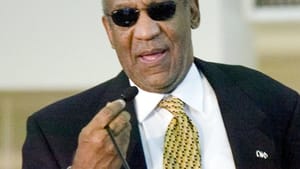Stay in the Loop
BSR publishes on a weekly schedule, with an email newsletter every Wednesday and Thursday morning. There’s no paywall, and subscribing is always free.
What to do with Cosby?
Bill Cosby, reconsidered (yet again)

Bill Cosby, who once defined himself as America’s dad, was first exposed as a serial rapist 13 years ago. Last week, this hypocrite was finally judged a criminal (pending his appeal, of course) in a court of law. Upon hearing the guilty verdict, the self-styled family role model, who once scolded Eddie Murphy for subjecting teenage audiences to profanity, dropped his avuncular veil long enough to shout “You asshole!” at the prosecutor.
But now all enlightened Americans — both of us — confront two sticky questions. First, beyond the legal verdict on Cosby, how should such a man be defined? And what exactly should a civilized society do with him?
I trust that my own credentials as a Cosby critic are beyond dispute. In December 1992 — fully 13 years before any sexual allegations surfaced against him — I wrote a column in the Welcomat (the alternative paper now known as Philadelphia Weekly) arguing that the warm and witty TV persona he projected in The Cosby Show was a ludicrous façade.
At the time, I felt like a voice crying the wilderness. But since 2005, some five dozen women have publicly accused Cosby of drugging and assaulting them, in some cases more than 50 years ago. For years, these women felt too intimidated by Cosby’s fame and power to file charges or to make their accusations public. No more. Within the past year, hundreds of women have mustered the courage to come forward with long-repressed (or ignored) accusations of sexual abuse by powerful men, Cosby among them.
Seduction method
I suppose I should feel vindicated, at least as far as Cosby is concerned. So why has this verdict left me with an empty feeling?
Consider Cosby’s standard operating pattern. Virtually all of his accusers tell an identical story: On the pretext of offering career guidance or fatherly mentoring, he enticed them into his home or hotel room. There he offered his trusting victims a pill and a drink, allegedly to put them at ease. The women quickly lost consciousness, and when they awoke they found themselves in bed, naked and feeling violated. Sometimes Cosby would be naked or in a bathrobe beside them.
Cosby himself inadvertently confirmed the truth of these stories. In a deposition related to his 2006 settlement with Andrea Costand, he readily acknowledged his practice of routinely giving women Quaaludes and other sedatives, “the same as a person would say ‘Have a drink.'”
Marie Curie's verdict
Cosby spoke candidly in that deposition because he believed — wrongly, as it turned out — that the transcript would be sealed. And he portrayed all that drugging and sex as consensual.
But let’s assume (as I do) that Cosby’s accusers are credible. How would you characterize a man who repeatedly drugged and assaulted unconscious women for decades, reducing his victims to the equivalent of cadavers? He's a criminal, yes. But he's also, to my mind, a very sick man— one in need of therapy as much as punishment.
Ultimately the Cosby case offers yet another demonstration of the limitations of laws and courts when it comes to dealing with many types of antisocial behavior. Alternative tools do exist. The science of understanding and healing the human psyche is still in its relative infancy.
“Nothing in life is to be feared,” Marie Curie famously remarked. “It is only to be understood.” For the benefit of human progress, those of us who once summoned the courage to stand up to Bill Cosby must now rise above fear and summon the wisdom to understand what made him tick.
Sign up for our newsletter
All of the week's new articles, all in one place. Sign up for the free weekly BSR newsletters, and don't miss a conversation.
 Dan Rottenberg
Dan Rottenberg